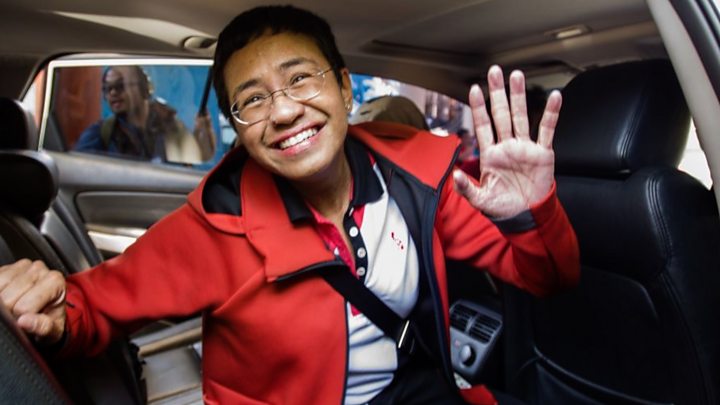Image copyright
EPA
Maria Ressa said the charges were politically motivated
In a case seen as a test of the Philippines’ media freedom, journalist Maria Ressa has been found guilty of cyber libel.
She denied the charges and claimed they were politically motivated.
A former writer for her news site, Rappler, was also convicted. Both have been released on bail pending appeal, but could face six years in prison.
Press freedom advocates say the trial is aimed at silencing critics of President Rodrigo Duterte.
But the president and his supporters have accused her, and her site, of reporting fake news.
In a country where journalists are under threat, Ms Ressa’s case became symbolic and closely-followed – both domestically and internationally.
What is she accused of?
The case against her relates to an eight-year-old Rappler story on businessman Wilfredo Keng’s alleged ties to a former judge.
The prosecution came under a “cyber-libel” law which came into force in September 2012 – four months after Rappler published the article.
- Who is Philippine news boss Maria Ressa?
- Why Rappler is raising Philippine press freedom fears
But prosecutors said a correction to the story in 2014 – to fix a “typo” – meant the article was covered by the law.
The judge on Monday said Rappler offered no proof to back up its allegations against Mr Keng.
Judge Rainelda Montea added that her verdict was based on evidence presented to the court – adding that freedom of the press cannot be used as a shield against libel.
The Rappler boss says she will fight the verdict
Ms Ressa and her colleague were allowed to remain free on bail, pending a possible appeal.
But if the conviction stands, it carries a sentence of up to six years.
“We are going to stand up against any kind of attacks against press freedom,” she said after the trial.
Who is Maria Ressa?
Born in the Philippines, Ms Ressa grew up in the US and only returned to the country in the 1980s after the fall of authoritarian leader Ferdinand Marcos.
A former CNN journalist, she founded Rappler in 2012. It is one of the few local sites to openly criticise the Duterte administration and its brutal war on drugs, which has claimed thousands of lives.
Rappler and Ms Ressa have also been targeted in other court cases, ranging from tax evasion to foreign ownership violations.
At the scene
Howard Johnson, Philippines correspondent
I was directly behind Maria Ressa in court. She silently shook her head as the judge declared there had been no government influence on today’s case.
She has long argued the case was politically-motivated – pointing to the 11 cases filed against Rappler in 2018, including charges of tax evasion and foreign ownership violations, as proof.
President Duterte once called Rappler a “fake news outlet” after being irked by reporting into his punitive policies, and alleged conflicts of interest in his inner circle – allegations he has always denied.
But lawyers for Wilfredo Keng insist today’s case was about clearing the name of their client, after Rappler’s allegations, citing an “intelligence report”, that Mr Keng was involved in human trafficking and drug smuggling.
He has always denied the allegations.
Judge Rainelda Montea said Rappler had failed to present the report to the court – and hadn’t verified the claims allegedly contained within it.
How are journalists treated in the Philippines?
While freedom of the press is guaranteed under the constitution, the Philippines is one of the most dangerous places in the world for journalists, says US-based Freedom House.
“Private militias, often hired by local politicians, silence journalists with complete impunity,” says Reporters Without Borders.
Critics of President Duterte say that since he came to power, the media has been subject to pressure and retaliation from the government, if it criticises the administration too strongly.
Image copyright
Getty Images
Mr Duterte has called Rappler “fake news”
“The verdict highlights the ability of the Philippines’ abusive leader to manipulate the laws to go after critical, well-respected media voices whatever the ultimate cost to the country,” Phil Robertson, deputy Asia director at Human Rights Watch, said.
Last month, one of the country’s leading broadcasters, ABS CBN went off air after it was ordered by the media regulator to stop operations while waiting for the renewal of its licence.
The channel has in the past angered President Duterte.
- Duterte: The ‘strongman’ of the Philippines
- The state of Philippine media
“With this latest assault on independent media, the human rights record of the Philippines continues its free fall,” Amnesty International’s Asia-Pacific Regional Director, Nicholas Bequelin, said.
“It is time for the UN to urgently open an international investigation into the country’s human rights crisis, in line with the recent conclusions of the UN Human Rights office itself.”

Media playback is unsupported on your device